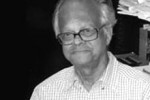Englander on Subjectivity, Memory, and Human Science
Jun 19th, 2014 | By Marc Applebaum
In this chapter Magnus Englander explores Subjectivity, Memory, and Human Science as part of a festschrift volume honoring Amedeo Giorgi.

In this chapter Magnus Englander explores Subjectivity, Memory, and Human Science as part of a festschrift volume honoring Amedeo Giorgi.

“No one is saved and no one is totally lost.” (171) With these words Merleau-Ponty closes the section of his Phenomenology of Perception dedicated to the Body in its Sexual Being. Why should we feel lost or safe in relation to sexuality? And what does sexuality have to do with metaphysics? Merleau-Ponty and Husserl explain
[continue reading…]

Dr. Ferrarello co-taught a graduate seminar in phenomenological psychology in January 2014 for doctoral students at Saybrook. She led students in a day-long reflection on the steps in qualitative data gathering and analysis which they had practiced during the preceding days, guiding their reflection on the meaning of the steps in the research process, and
[continue reading…]

Magnus Englander, Susi Ferrarello, and Marc Applebaum collaborated in presenting a panel, “Phenomenological Research: Philosophy and Psychology in Dialogue” at the 32nd annual International Human Science Research Conference in Aalborg, Denmark. Englander’s presentation was his reflection as a qualitative psychological researcher on philosophical proposals to phenomenologically “frontload” empirical experiments. He addressed philosophers Shaun Gallagher and
[continue reading…]

The way we creatively embody and express the traditions we inherit, whether philosophical or psychological, is inevitably shaped by our own history, background, and values. In my case, before I began my study of phenomenology I had already worked as a teacher and counselor. I’ve been a teacher of one kind or another since I
[continue reading…]

It may be that to see yourself, it is not sufficient to look at yourself in a mirror, because you may not want to see yourself or, more likely, you aren’t able to see yourself as the subject of your seeing. It may be that you do not want to pay attention to those
[continue reading…]

This interview with Yannis Toussulis is the first in a series of conversations about the role phenomenology, both descriptive and hermeneutic, plays in clinical practice. Yannis Toussulis received his PhD in Psychology from Saybrook Graduate School in 1995. His dissertation, supervised by Amedeo Giorgi, was entitled “Faith as A Lived-Experience: A Phenomenological Study”. He is a
[continue reading…]

This is the Q & A portion of the presentation given by philosopher J. N. Mohanty and psychologist Amedeo Giorgi participated in a panel discussion on phenomenology as part of the annual meeting of the Interdisciplinary Coalition of North American Phenomenologists held at Ramapo College on May 25, 2013. James Morley moderated and questioners included Louis Sass and Lester
[continue reading…]

On May 25, 2013 the philosopher J. N. Mohanty and the psychologist Amedeo Giorgi participated in a panel discussion on phenomenology as part of the annual meeting of the Interdisciplinary Coalition of North American Phenomenologists held at Ramapo College. The talk was moderated by James Morley; questioners included Louis Sass and Lester Embree. This is Part One
[continue reading…]

This morning I’m rereading bits of Alain Badiou’s beautiful book Ethics (L’éthique: Essai sur la conscience du mal). I’m struck again by how revelatory this text is on such a range of issues, and how useful for a renewed psychology, at the same time. I mentioned to a friend recently that Badiou’s discussion of becoming-a-subject
[continue reading…]